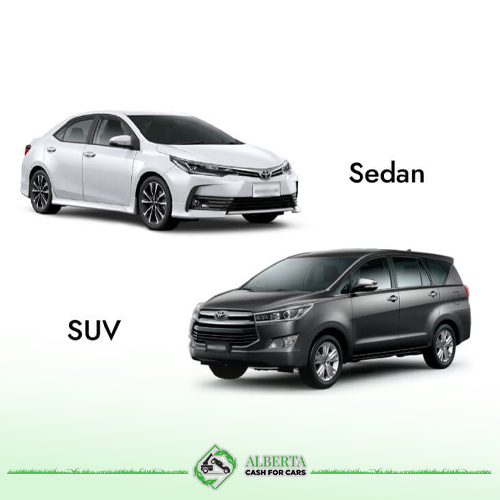When you plan to buy a new car, many factors influence your decision. SUVs and sedans both offer their own advantages to the driver and passengers, but knowing which option is right for your needs can make this decision a bit difficult. The differences between SUVs and sedans should be considered before purchasing. In general, SUVs provide a sense of safety, more capacity for passengers and cargo, and a more powerful presence on the road. On the other hand, sedans are lighter and can provide better fuel efficiency, easier maneuvering, and the lowest price.
Finally, the right choice between an SUV or sedan depends on your preferences and needs. In the following, we at Cash for Cars Calgary want to provide you with a complete guide in response to the question of ” SUV or sedan?” so stay with us until the end of the article.
About SUVs
SUVs are usually large and well-built cars and have an impressive appearance. The long and heavy nature of this car is designed to attract people’s attention. In the past, SUVs were boxy with a sharply chopped tail end. With curved rear ends and a well-designed overall appearance, recent models have revolutionized the concept.
With SUVs, you can go off-road and enjoy it. This car is designed to drive in rough areas, mountainous terrain, and rocky paths, and a high ride suspension system and optimal distance from the ground are made. SUVs were not recommended for city driving in the past; this may have been because they were designed for off-road needs. Now, SUVs have removed this label.
With the help of specially engineered platforms, SUVs are now perfectly suited for city, highway, and off-road driving. Manufacturers are currently focusing on fuel consumption as well. With gas costs rising, SUVs that get better mileage are among the best options.
About Sedans
Sedans are distinguished from other cars by their aerodynamic design. Sedans create the least drag when moving because they smooth the airflow. These cars are located at a low height and have less distance from the ground. Distinct boot space is provided by the three-section design. Sedans that are attractive both in terms of fuel consumption and beauty are very popular. Depending on your budget, you may want to buy a sedan.
SUV or sedan: Comparison
Choosing a car to buy is not as easy as it seems. Before you even think about the make and model of your vehicle, you should first answer the question, “SUV or sedan?” Both have features that can help you choose. The most important thing to keep in mind is that your choice should meet your current and future needs. Here are the differences between an SUV and a sedan:
Looks
Compared to the bulky exterior design of SUVs, sedans have a more sporty and simple appearance. Most sedans are designed to be more aerodynamic than SUVs, however, innovations in SUV designs have made them less boxy compared to earlier models.
Suspension and Ride Height
Sedans have less ground clearance than SUVs, and driving these cars on rough terrain is a bit difficult. On the other hand, SUVs have a longer distance from the ground and are designed with a stronger suspension system for a more comfortable off-road driving experience. Of course, the distance above the ground can make it a bit difficult for the elderly to ride properly.
Storage and Seating Space
If you have a family, the ideal choice for you is an SUV. Because SUVs are bigger, they have more capacity. A maximum of 6 to 7 people can sit inside an SUV. While sedans have a maximum capacity of about 5 people So when it comes to storage space, SUVs are a better choice.
Fuel Economy
Because sedans are smaller than larger SUVs, they consume more fuel, and most of today’s sedans have a basic four-cylinder or V6, which increases their fuel efficiency.
A comprehensive examination of SUV vs sedan fuel economy
The SUV vs sedan fuel economy has long been a topic of interest for consumers, policymakers, and automotive enthusiasts alike. This comprehensive examination delves into the nuances across various models and sizes within these two popular vehicle categories.
When comparing SUV vs sedan fuel economy, sedans have always been better than SUVs. Because sedans are naturally less heavy and have a lower profile than SUVs, they usually get better fuel efficiency. Sedans are a desirable choice for individuals who are concerned about fuel costs because of their ability to go farther on a single gallon of fuel thanks to smaller engines and more aerodynamic designs.
However, advancements in automotive technology are challenging these traditional norms. Manufacturers are increasingly incorporating innovative materials and aerodynamic designs into SUVs, seeking to improve their fuel efficiency. The introduction of hybrid and electric SUV models further blurs the lines, as these alternative powertrains can offer significant gains in fuel economy compared to their traditional counterparts.
Size and weight are still significant factors. Compact and crossover SUVs usually get better fuel economy ratings than their larger, full-size counterparts. The market’s response to this trend can be seen in the popularity of compact SUVs, which blend luxurious interiors with a smaller, more fuel-efficient footprint.
Customer preferences are crucial in this comparison. Although SUVs’ utility and versatility often win over buyers who value off-road capabilities, cargo space, and elevated driving positions, sedans may seem to have better fuel efficiency.
With changes in consumer preferences and technological advancements, the fuel economy differences between SUVs and sedans continue to change. The standard trade-offs between size, functionality, and fuel efficiency are starting to loosen up as manufacturers keep coming up with new ideas. Nowadays, selecting between an SUV and a sedan requires thoughtfully considering each model’s unique technological features, driving style, and personal needs.
Performance
Sedans are not as big as SUVs and are easier to drive and park. This feature is suitable for people who are looking for a comfortable car that they can move around the city. On the other hand, SUVs may be a good city vehicle, but due to their larger dimensions, they are more difficult to drive and park. An SUV gives you the ability to take it off the road and look for weekend adventures.
Price
When talking about the price, it should be said that SUVs are usually more expensive than sedans. The reason for this is that SUVs are bigger and consume more fuel.
Difference between SUV and Sedan in Environmental Impact
While fuel efficiency plays a role, the environmental impact of SUVs and sedans goes beyond just gas mileage. Here’s a look at some key considerations, especially regarding the difference between SUV and sedan.
- Emissions: Larger SUVs require more materials to manufacture, leading to a bigger carbon footprint during production. Additionally, their size often translates to more pollutants like dust and tire particles being kicked up while driving.
- Resources: Manufacturing any car uses resources, but SUVs typically require more raw materials due to their size. This can put a strain on mining and processing of these materials, highlighting another key difference between SUV and sedan.
- Lifecycle Impact: Consider the entire lifespan of the vehicle. SUVs might be more difficult and energy-intensive to recycle due to their size and complexity.
Greener Choices:
- Size Matters: Opt for a vehicle sized to your actual needs. If you rarely use all the space an SUV offers, a sedan likely suffices. This is a crucial consideration when evaluating the difference between SUV and sedan for your environmental impact.
- Lightweight Design: Look for cars built with lightweight materials that minimize environmental impact during production and use.
- Electric Future: Consider electric or hybrid options for the lowest possible emissions footprint.
By making informed choices, you can minimize your environmental impact regardless of whether you choose an SUV or a sedan. However, understanding the difference between SUV and sedan in terms of environmental impact can help you make a greener decision.
Sedan or SUV which is better?
Most people have a false sense of what is right for them. If you are going to choose between an SUV or sedan, it is important to ask yourself what your needs are because both types of vehicles have certain advantages and disadvantages. Which car is right for you depends on exactly what you expect from your vehicle.
Compare the crash test ratings of popular SUVs and sedans
Crash test ratings serve as a crucial benchmark for assessing SUV vs sedan safety, helping consumers make informed decisions. When comparing the crash test ratings of popular SUVs and sedans, it’s important to consider the evaluations conducted by reputable organizations such as the National Highway Traffic Safety Administration (NHTSA) and the Insurance Institute for Highway Safety (IIHS).
NHTSA employs a 5-star rating system, evaluating frontal crashes, side crashes, and rollover resistance. SUV vs sedan safety often exhibits varying performance in these categories due to differences in design and weight distribution. SUVs, with their higher center of gravity, might face challenges in rollover resistance compared to sedans. However, advancements in stability control systems have improved the safety of many SUVs.
The IIHS, on the other hand, conducts a more comprehensive set of tests, including moderate and small overlap frontal crashes, side impacts, roof strength, and head restraints. The results contribute to their Top Safety Pick and Top Safety Pick+ awards. While both SUVs and sedans can achieve high ratings, their performance can differ.
Manufacturers have made progress in recent years to improve the safety features of both vehicle types. Automatic emergency braking, lane departure warning, and upgraded airbag systems are examples of common safety technologies. These developments have aided in the improvement of crashworthiness and injury avoidance.
Consumers must carefully examine the precise crash test ratings of individual models in the SUV and sedan categories, as safety performance can vary greatly. Furthermore, developments in SUV vs sedan safety are continual, with manufacturers adopting new technologies regularly to address developing safety concerns. Finally, choosing between an SUV and a sedan should take into account not just crash test ratings but also personal tastes, needs, and driving patterns.
Conclusion
When you want to decide which car is more suitable for you, you should consider the advantages and disadvantages of each one when buying. Ultimately, the right choice for you depends on your preferences and individual needs. If safety and visibility are your priorities, then an SUV is the ideal option for you. If you need a vehicle with more capacity for passengers and cargo, SUVs are definitely for you. If you are looking for an affordable car, sedans are a better choice. Whatever car you choose should meet your needs and lifestyle. If you need more information about buying or selling cars, you can contact Cash for Auto Alberta for a free consultation.









